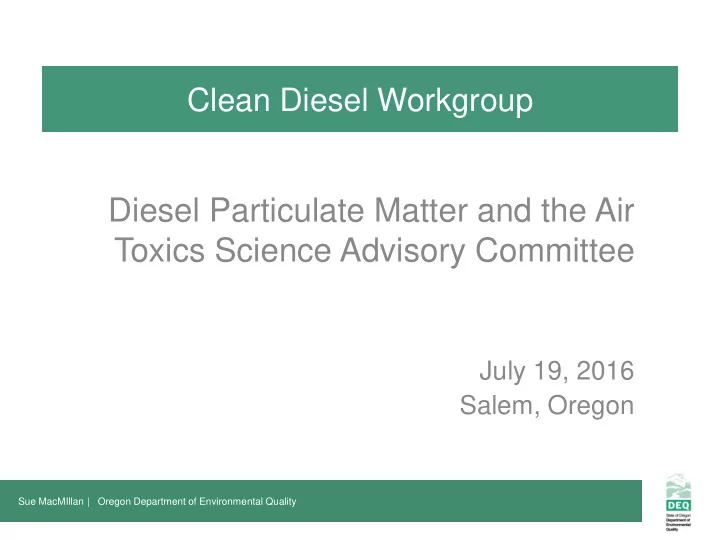

Clean Diesel Workgroup Diesel Particulate Matter and the Air Toxics Science Advisory Committee July 19, 2016 Salem, Oregon Sue MacMIllan | Oregon Department of Environmental Quality
Air Benchmark Concentrations • Protect human health and environment • Air Toxics Rule adopted October 2003 • Form an Air Toxics Science Advisory Committee (ATSAC) • Select ambient benchmark concentrations • Adopted as guidelines into rule • Support air program activities
Air Toxics Science Advisory Committee (ATSAC) • First convened in 2004 • Related rulemaking 2006 • Ambient Benchmark Concentrations table 2010 • Reconvened 2015 to review ABCs -- required by rule every 5 years -- 11 meetings Dec. 2014 – Jan. 2016
Air Toxics Science Advisory Committee (ATSAC) Technical science-based work only Committee of seven volunteer outside experts: Toxicology Environmental science/environmental engineering Risk assessment Epidemiology/biostatistics Medicine (physician) with experience in Public Health Air pollution modeling, monitoring, meteorology, or engineering
Air Toxics Science Advisory Committee (ATSAC) • Charged with using only toxicity data available from recognized agencies (e.g., IRIS, OEHHA, ASTDR) to make their recommendations • Recommends ABC revisions or retentions to DEQ
ATSAC Review of Benchmarks • Toxicity data is constantly changing, hence need for intermittent review of ABCs • 52 standing benchmarks were considered for comprehensive toxicity information review; plus 4 new chemicals (phosgene; fluorides; n-propyl bromide, styrene) • 27 of 52 needed review by the ATSAC, including the ABC for diesel particulate matter (DPM)
ATSAC Review of Current ABC for DPM • In 2006, the ATSAC recommended 0.1 ug/m 3 , which was adopted by the EQC • Considered but did not choose Cal Office of Environmental Health Hazard Assessment (OHHEA) Unit Risk Estimate value of 0.0003 per ug/m 3 at that time • New qualitative information available since 2006, but no quantitative • More in-depth review of Cal OEHHA value performed
ATSAC Review of Current ABC for DPM • Majority of 3 of 11 meetings devoted to DPM toxicity information • ATSAC has not yet made a recommendation • For first time, an ATSAC member ATSAC offered to prepare primary calculations for DPM toxicity; still pending
Speaker contact information: Sue MacMillan Air Toxics Science and Policy Analyst Technical Services, Environmental Solutions, Air Division, DEQ 503.229.6458 Macmillan.susan@deq.state.or.us
Documents can be provided upon request in an alternate format for individuals with disabilities or in a language other than English for people with limited English skills. To request a document in another format or language, call DEQ in Portland at 503-229-5696, or toll-free in Oregon at 1-800-452-4011, ext. 5696; or email deqinfo@deq.state.or.us.
Recommend
More recommend